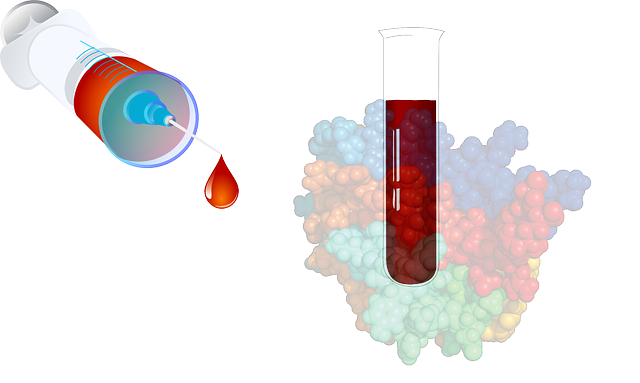Liver function tests (LFTs) are critical for evaluating liver health, especially in the UK's unique healthcare context. Among these, the Vitamin B12 blood test is essential for detecting deficiencies that can cause anemia and neurological issues, often reflected in abnormal LFT results. Medical professionals use this test, along with other markers like ALP, ALT, AST, bilirubin, and GGT, to diagnose conditions ranging from hepatitis to non-alcoholic fatty liver disease (NAFLD). Incorporating Vitamin B12 tests aids in personalized treatment plans by addressing deficiencies that might contribute to liver problems.
Liver function tests (LFTs) are essential tools in a medical professional’s arsenal, offering insights into liver health. This article delves into the intricacies of LFTs, focusing on the Vitamin B12 Blood Test UK—a crucial indicator of overall well-being. We explore the significance of this test, its procedure, and interpretative nuances for optimal patient care. By understanding these aspects, healthcare providers can accurately diagnose and implement effective treatment strategies, especially in the context of Vitamin B12 levels in the UK.
- Understanding Liver Function Tests: What Medical Professionals Need to Know
- Vitamin B12 Blood Test UK: Significance and Procedure for Optimal Patient Care
- Interpreting Results: Ensuring Accurate Diagnosis and Effective Treatment Strategies
Understanding Liver Function Tests: What Medical Professionals Need to Know
Liver function tests (LFTs) are a crucial diagnostic tool for medical professionals, offering insights into the health and efficiency of the liver. These tests are essential for identifying and managing various liver conditions, as well as monitoring the effects of certain medications or treatments. One common LFT involves assessing vitamin B12 levels in the blood, which is particularly relevant in the UK given the country’s unique dietary and healthcare landscape.
Medical professionals should understand that LFTs measure key enzymes and proteins produced by the liver. Elevated or decreased levels can indicate inflammation, damage, or dysfunction. For instance, elevated alanine aminotransferase (ALT) and aspartate aminotransferase (AST) levels often signal liver cell injury, while low albumin levels can suggest impaired synthetic function. Vitamin B12 blood tests are integral to these assessments, as deficiency can lead to anaemia and neurological issues, which may manifest as abnormal LFT results. Proficiency in interpreting these findings is vital for accurate diagnosis and tailoring effective treatment plans.
Vitamin B12 Blood Test UK: Significance and Procedure for Optimal Patient Care
In the UK, the Vitamin B12 Blood Test is a crucial component of comprehensive patient care, particularly for individuals with potential nutritional deficiencies or anaemia. This test plays a significant role in diagnosing and managing pernicious anaemia, a condition where the body cannot absorb vitamin B12 from food due to a lack of intrinsic factor, a protein produced by the stomach. By measuring the levels of vitamin B12 in the blood, medical professionals can identify individuals at risk and implement appropriate treatment strategies.
The procedure for the Vitamin B12 Blood Test UK is straightforward. A healthcare provider will typically draw a small sample of blood from a patient’s vein, usually in the arm. This sample is then sent to a laboratory for analysis using specialized equipment. Results are usually available within a few days, providing critical insights into the patient’s vitamin B12 status. Optimal patient care involves interpreting these results in conjunction with clinical symptoms and other laboratory findings to tailor treatment plans effectively, ensuring patients receive the necessary supplementation or dietary adjustments for optimal health and well-being.
Interpreting Results: Ensuring Accurate Diagnosis and Effective Treatment Strategies
Interpreting results from a liver function test is a critical step in ensuring accurate diagnosis and effective treatment strategies for patients. As medical professionals, understanding the nuances of each marker—like alkaline phosphatase (ALP), alanine aminotransferase (ALT), aspartate aminotransferase (AST), total bilirubin, direct bilirubin, and gamma-glutamyl transferase (GGT)—is paramount. Elevated or depressed levels can indicate a range of conditions, from hepatitis to cirrhosis, or even deficiencies like Vitamin B12 deficiency, which can impact liver health in the UK.
Accurate interpretation requires considering not just individual results but also patient history, symptoms, and other laboratory findings. For instance, elevated GGT may suggest alcohol abuse, while low ALT levels could point to non-alcoholic fatty liver disease (NAFLD). A comprehensive analysis involving Vitamin B12 blood tests in the UK can further tailor treatment plans, addressing specific deficiencies that might contribute to liver issues.
Liver function tests are vital tools for medical professionals, offering insights into liver health. Understanding these tests, such as the Vitamin B12 blood test UK, is crucial for accurate diagnosis and effective treatment strategies. By interpretating results competently, healthcare providers can ensure optimal patient care, addressing any liver-related concerns promptly and efficiently.
